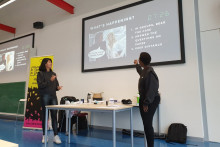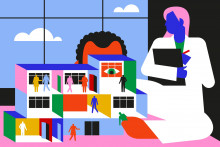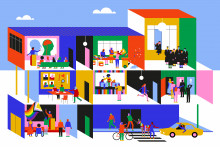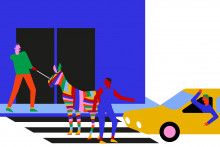During the workshops, which took place last week, the groups were divided into couples. The partners did not know each other, but had to write down a list of characteristics about the other in advance, based on their first impression. 'We wanted to point out unconscious biases to students,' says Bantje. 'Everyone has preconceptions and we use them all day long. But if people are aware of them, they can look beyond the first impression. After all, you are far from always right at first. The lists during the workshops also often turned out not to match the real life story.'
After this exercise, students collectively shared their stories about racism, discrimination and exclusion. According to Man and Bantje, many students demonstrated great vulnerability. ‘They were very courageous to share their stories,' says Bantje. 'We were surprised by the shocking stories we heard. One Romanian student, for example, was asked 'as a joke' by a UT teacher if his parents' car was stolen. Or another story, where two students of colour were kicked out of a club in Enschede nightlife for no reason, after two white men had a fight.'
Normalise
Fellow students were disturbed by the stories. Yet there was also a group that normalised or laughed off the discriminatory behaviour, says Man. 'While we have a collective responsibility to change the behaviour. Inclusion and diversity is not something for minorities; it is about allowing all people to be who they want to be. Through the workshop, we hope students will be more aware of their surroundings. We want to plant that seed.'
Moreover, many students end up in an international environment in later life, argues Man. 'What kind of engineer do you want to become then? If you want to work in an international context, you have to take different backgrounds into account and being aware of your surroundings is key for that.' Even when designing, it is important to take this into account, Bantje adds. 'If a design is appropriate for a diverse, broad group, it will not exclude people. And this is also commercially much more interesting.'
Internationals
There are big differences between what international and Dutch students experience in terms of discrimination and exclusion, Man knows. 'Just think of the 'Dutch only' policy of many student houses, student associations with hardly any international members, or lecturers who do not have proper English skills while it is the official language. There is a task for the university there, because the UT strives for internationalisation, but the infrastructure still lags behind. Ultimately, the UT has a responsibility to offer everyone a good university experience.'
The UT's support could also be better, argue Man and Bantje. 'It needs to be clearer where students can find a listening ear and share their stories in confidentiality, so that everyone is able to participate equally at university.' Even with discrimination in nightlife, the UT can do more, says Bantje. 'The university is such a big employer in the area. They have to lobby to prevent it from happening. Just say as a university: our people are not treated well here. It is important that people stand up when something like this happens, even if it only helps one person.'
The annual Diversity & Inclusion workshop is mandatory for Mechanical Engineering, Civil Engineering and Industrial Design Engineering students and was made possible by money from the Incentive Fund, a fund for ideas that contribute to greater diversity, equality and inclusion at the UT.







